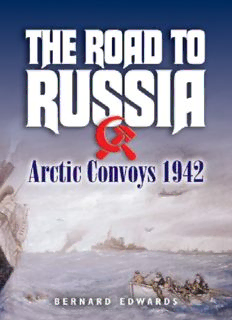
The Road to Russia: Arctic Convoys 1942-1945 PDF
Preview The Road to Russia: Arctic Convoys 1942-1945
By the same author Masters Next to God They Sank the Red Dragon The Fighting Tramps The Grey Widow Maker Blood and Bushido SOS – Men Against the Sea Salvo! Attack and Sink Dönitz and the Wolf Packs Return of the Coffin Ships Beware Raiders! First published in Great Britain in 2002 by LEO COOPER an imprint of Pen & Sword Books 47 Church Street, Barnsley, South Yorkshire, S70 2AS Copyright © 2002 by Bernard Edwards ISBN 0 85052 898 4 eISBN 978 1 78337 941 5 A catalogue record for this book is available from the British Library Typeset in 11/13pt Sabon by Phoenix Typesetting, Burley-in-Wharfedale, West Yorkshire Printed in England by CPI UK This book is dedicated to all those who fought and died on the road to Russia. ‘Death barred the way to Russia, but you crosst.’ John Masefield, For All Seafarers Contents Acknowledgements Introduction Chapter One Chapter Two Chapter Three Chapter Four Chapter Five Chapter Six Chapter Seven Chapter Eight Chapter Nine Chapter Ten Chapter Eleven Chapter Twelve Chapter Thirteen Chapter Fourteen Chapter Fifteen Epilogue Bibliography Acknowledgements The author wishes to thank the following for their help in the research for this book: George C. Bean, Thomas R. Bowerman, Mike Buckingham, C. Bernard Covington, Richard Elvin, Leo Hogan, Albert Kelder, Charles A. Lloyd, Arthur MacLaren, Ian A. Millar, Frits Noorbergen, Peter L. Price, Mike Raymond, Barbara Reher, Neil Staples, Tony Thomas, Barry L. Zerby, and Flower Class Corvette Association, Merchant Navy Association, National Archives & Records Administration, National Headquarters American Merchant Marine Veterans, Public Record Office, Registry of Shipping & Seamen, US Armed Guard WW II Veterans. Introduction This is the story of a very gallant company of men, who in the dark days of 1942 brought their ships through to Russia by the Arctic route. They were drawn from a dozen diverse nations, but united by a common cause; to bring aid to a beleaguered ally. If by doing so they helped to change the fortunes of a war, then being dictated by the crushing superiority of the Axis Powers, they considered their work well done. In a single voyage, the men who sailed the convoys to North Russia faced more dangers than many others faced in six years of war. Their age-old enemy, the weather, was relentless. It fluctuated from violent storms that threatened to swamp the grossly overloaded merchantmen and crush the thin-hulled escorts, to flat calms and dense fogs. Caught in fog, the ships, unable to stand still, were forced to steam blind, under constant threat of collision with each other and ever watchful for the silent approach of icebergs and growlers, some big enough to rip their bottoms open from stem to stern. If the weather was overcome – or at least held at bay – there was still the other enemy to contend with. He, too, was relentless, attacking from the air with high-level bombers, dive-bombers and torpedo bombers, on the surface with fast, powerful warships, and from beneath the sea with the shadowing U-boat. For much of the year, overlaying and aggravating all these dangers, was the awful, bone-chilling cold of the Arctic; a cold so intense that it immobilized the body and numbed the brain. Death followed within two minutes for any man entering the water, and those who found themselves adrift in open boats were promised a slow death by exposure or, at the very least, the pain and indignities of frostbite and immersion foot, which so often led to the horrors of amputation. For those who won through to Russia against such fearful odds, there was no safe haven at the end. The German bombers followed them into port, and continued to rain down death and destruction as they struggled to discharge the guns and tanks they had so diligently carried across the sea. All too often, their efforts were brought to nothing as ship and cargo were blown asunder or consumed by fire. But perhaps the most bitter blow they had to take was the rejection by the people they had endured so much to help. The ordinary Russian citizen was too cowed by authority to openly fraternize, and Soviet officialdom regarded them as agents of the hated capitalist system, and put every possible obstacle in their way. The sea road to Russia was long and fraught with many dangers and frustrations, but these men did not hesitate to tread it, not just once, but voyage after voyage. They were true heroes.
Description: